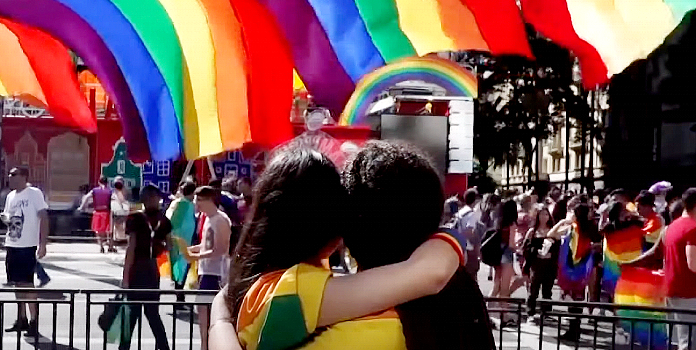(Joshua Paladino, Headline USA) In response to Florida’s Parental Rights in Education bill, HuffPost columnist Allegra Hirschman wrote that the real threat to children comes from “heterosexual grooming,” a “constant and ubiquitous” practice.
The article, “I’m Trying To Raise My Kids As Homosexuals (And I Never Even Have To Say ‘Gay’),” described heterosexual grooming as “a set of practices and expectations based on a child’s assigned gender at birth,” but then the explanation becomes bizarre.
Hirschman asserts that heterosexual parents promote “the formation of a romantic and possessive relationship between ‘opposite sex’ children and their parents.” These parents seek to create a “romantic bond” between the “penis baby” and his mother or the “vagina baby” and her father.
This child-rearing practice—which sounds more like a Freudian textbook than a traditional household—”sexualizes children.” No doubt it would, if anyone used it.
But, for Hirschman, the fact that heterosexual parents do not recognize their romantic bonds with their opposite-sex children gives away their participation in heterosexual grooming.
“That’s because this problem is systemic and it’s a system straight and cisgender people benefit from and uphold,” she wrote.
For evidence of this, Hirschman points to the onesies that girls wear upon arriving home from the hospital, with slogans like, “Daddy’s Girl” and “Sorry, boys! Daddy says no dating.”
Boys come home with opposite apparel that reads, “Sorry, girls! My heart belongs to mommy” or “Boob Man.”
“I know, I know, this is all in good fun ― if your idea of “fun” is strategically forcing a sexual orientation on children before they can say “Dada” or “Mama,” she wrote.
Hirschman then mocks the idea that she and her female life-partner are trying to turn their daughter and son into homosexuals.
Supposedly, she does not actually want heterosexual or homosexual grooming, but she believes that tolerant education, plus a no-grooming mindset, conveniently, will produce far more LGBTQ+ children.
“That actually might mean that more kids end up coming out as some part of the LGBTQ community and that will mean we end up with more LGBTQ people,” she wrote.
“But it’s not because learning about us made them LGBTQ,” she continued. “It just means it made them feel OK to be exactly who they are — and gay, or straight, or any other identity, really, that’s what we should all want for our kids, isn’t it?”

